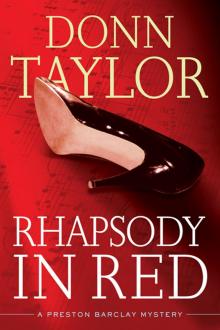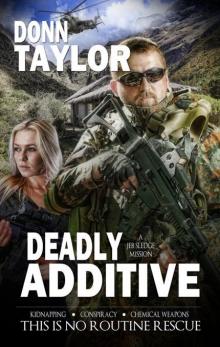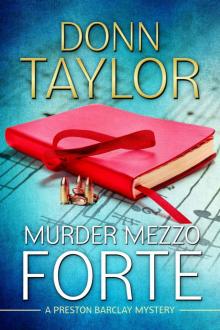- Home
- Donn Taylor
Deadly Additive
Deadly Additive Read online
Table of Contents
Title Page
copyright
Dedication
Acknowledgments
Praise for Donn Taylor
1
2
3
4
5
6
7
8
9
10
11
12
13
14
15
16
17
18
19
20
21
22
23
24
25
26
27
28
29
30
31
32
33
34
35
Thanks
Deadly Additive
Donn Taylor
This is a work of fiction. Names, characters, places, and incidents either are the product of the author’s imagination or are used fictitiously, and any resemblance to actual persons living or dead, business establishments, events, or locales, is entirely coincidental.
Deadly Additive
COPYRIGHT 2012 by Donn Taylor
All rights reserved. No part of this book may be used or reproduced in any manner whatsoever without written permission of the author or Pelican Ventures, LLC except in the case of brief quotations embodied in critical articles or reviews.
eBook editions are licensed for your personal enjoyment only. eBooks may not be re-sold, copied or given away to other people. If you would like to share an eBook edition, please purchase an additional copy for each person you share it with.
Contact Information: [email protected]
Scripture texts in this work are taken from the New American Bible with Revised New Testament (c) 1986, 1970 Confraternity of Christian Doctrine, Washington, D.C. and are used by permission of the copyright owner. All Rights Reserved. No part of the New American Bible may be reproduced in any form without permission in writing from the copyright owner.
Cover Art by Nicola Martinez
Harbourlight Books, a division of Pelican Ventures, LLC
www.pelicanbookgroup.com PO Box 1738 *Aztec, NM * 87410
Harbourlight Books sail and mast logo is a trademark of Pelican Ventures, LLC
Publishing History
First Harbourlight Edition, 2012
Paperback Edition ISBN 978-1-61116-187-8
Electronic Edition ISBN 978-1-61116-186-1
Published in the United States of America
Dedication
To Mildred
With thee conversing I forget all time,
All seasons and their change, all please alike.
~Milton
Acknowledgments
The nature of Soviet and satellite use of chemical warfare (“yellow rain”) in Laos, Cambodia, and Afghanistan remains controversial. I have followed declassified U.S. government accounts of it. However, placing three chemical agents in one munition is my own fictional invention.
The term “Second Protestant Reformation” was used by Yale University’s Professor Geoffrey Hartman in a literary essay.
I wish to thank Col. Dale E. Peyton, USA-Ret., for his expertise and invaluable advice concerning current airborne operations. Any technical errors are mine.
Thanks also to Guida Jackson for encouragement and to Wanda Dionne for astute and helpful chapter-by-chapter suggestions.
Special thanks to my agent, Terry Burns, for leading me to Harbourlight, and further thanks to Harbourlight’s Nicola Martinez and Fay Lamb, whose combined editorial skills greatly improved the novel.
I am deeply indebted to Mildred Taylor, my wife, for encouragement, understanding, and fruitful suggestions throughout the writing—but even more for her sound literary judgment, on which I rely when mine falters.
Praise for Donn Taylor
Of The Lazarus File:
“Like the best of Robert Ludlum...”-Bev Vincent, Author of “The Road to the Dark Tower”
“Taylor…displays the rare ability to convey emotion without resorting to profanity and to convey passion without specifying body parts.... The novel images a classic confrontation of good and evil.”-Carlos Ledson Miller, author of Panama and Belize
Of Rhapsody in Red:
“Richly embellished with literary and musical references and peopled with academia’s most intriguing eccentrics and snobs…”-CBA Retailers and Resources Magazine
“An expertly woven yarn that delights on every page.”-Cathy Elliot, author of A Vase of Mistaken Identity
“The descriptive wording is a delightful change from the clichés of most novels…”-Christian Review of Books
…you are anxious and worried about many things. There is need of only one.
Luke 10:41-42
1
Houston, Texas
By habit, Jeb Sledge disapproved of people who pointed weapons at him. The present offender’s tuxedo did not qualify him for an exception, and the silencer on his pistol only aggravated the offense.
They stood in the living room of Sledge’s drab one-bedroom apartment toward the northern edge of Houston. That morning his doctor had pronounced him fully recovered from last year’s wounds by an assassin. In the afternoon he’d refused an offer of two hundred thousand dollars to rescue the daughter of billionaire Steve Spinner from her Colombian kidnappers.
Sledge needed money. But Spinner had a reputation for ruthlessness hidden under a veneer of philanthropy. And the setup made no sense at all. When Spinner’s envoy grew insistent, Sledge threw him out.
Later that day, he’d gotten a call from Roger Brinkman, the retired CIA officer who now ran an “information service” known among experts as the best source for data on international crime. Brinkman didn’t say how he heard about Spinner’s offer, but he chided Sledge for turning it down. Vague rumblings of something new among the Columbian guerrillas, Brinkman suggested, and the Skinner problem might make a good takeoff point for the right operative.
Sledge said he’d think about it.
He did—for thirty seconds over dinner at a good Italian restaurant with reasonable prices and servers who didn’t introduce themselves. The dinner celebrated his advent as “New Sledge.” The old one was a hard case with a bad habit—volunteering for dangerous jobs to support noble causes. The cantankerous Old Sledge also enjoyed throwing his weight around, all two hundred and fifty pounds of it. But that Sledge had not survived the assassin’s bullets. The new one who’d sprung from his ashes would be too smart to take risks where there was no tangible reward. He would live the quiet life—find a safe administrative job on the periphery of law enforcement. And avoid noble causes.
Savoring the thought, Sledge drank a toast to his new self.
Afterwards, he drove his used Toyota pickup north on I-45 through the usual montage of glaring headlights and careening chariots. What he needed to complete the celebration was a good book and a CD of soft music. They would push back the world’s emptiness that closed in on him whenever the action stopped. Sooner or later, New Sledge would have to solve that problem.
But not tonight.
Tonight it was good just to be well again.
When he opened his apartment door, the security system gave no warning beep. Had he forgotten to set it?
Then the intruder switched on the lights, and New Sledge found himself looking into the silencer on a Walther PPK. He was caught. Too far in to dodge back outside and too far from his captor to attempt disarming him. Besides, the man weighed at least as much as Sledge and looked like he’d be hard to handle even without a gun. The ugly curl of his lip said he was itchi
ng for an excuse to pull the trigger.
Sledge’s anger blazed, but he raised his hands and controlled his voice. “You’re welcome to my fortune—thirty-three dollars and sixty-two cents. You’ll find the silverware in the kitchen drawer, but it’s actually stainless.”
“Shut up and sit down.” The gunman gestured with his left hand toward the sofa. In his right hand, he kept the pistol pointed at Sledge’s chest.
“Wait a minute.” A second gunman, as large as the first, emerged from the dark doorway of the kitchen and holstered a silenced pistol inside his tux jacket. Incongruously, his smile radiated good cheer. He spread-eagled Sledge and frisked him, then nodded to his companion and backed away.
Sledge eased himself onto the sofa, keeping his hands high. In a calm space somewhere behind his anger, he wondered how New Sledge should respond to this situation. Not that he had much choice.
The first gunman pointed with his free hand at the bookshelves that lined Sledge’s apartment walls. “We don’t need two men to take this guy. He’s a cream puff. A bookworm.”
The second gunman did not reply but called out, “OK, Mr. Spinner. He’s clean.”
A silver-haired man of medium build entered from the darkened bedroom and took a chair facing Sledge. The florid face above the man’s tuxedo showed a perpetual scowl, and he moved with the arrogance of someone who’d spent his life giving orders. His cologne wafted the subtle elegance only big money can buy.
The newcomer wasted no time. “You’re Jabez E. Sledge?”
Sledge nodded. He didn’t yet trust his voice.
“I’m Steve Spinner.” The visitor’s manner implied he’d come down from Olympus. “My man who talked to you today described you perfectly. He said you looked like a turretless tank with the commander’s head sticking out the top.”
Sledge was used to that kind of talk. People always mentioned the bulkiness first, his full two-fifty crammed into a mere six feet of height. Once accustomed to that, they said they found his face not unpleasing: broad, regular features, dark hair and complexion, with deep-set gray eyes that some found intimidating but others found intriguing.
So he dismissed Spinner’s taunt with a grunt. “You didn’t come here to praise my looks.”
The billionaire refused to be diverted. “You’ve made quite a record: all-conference middle guard for three years at Southwestern, called in as a reservist, decorated for Special Forces work in Afghanistan. And that closet full of uniforms says you’re still in the reserves.”
Sledge gritted his teeth. “I hope you didn’t steal any of them.”
“Not even those pretty gold leaves, Major.” Spinner made the word sound like an insult. “You could have played pro football, but instead you stayed for a full tour in the Army. Why?”
With danger apparently not imminent, Sledge played along. “Two hundred fifty was too light for a pro. And some things in this world are more important than playing games.”
Spinner raised a mocking eyebrow. “Like going to Colombia as a soldier of fortune? Who were you working for?”
Sledge ignored the question. “Do you always dress for burglaries? If I’d known this was formal, I’d have rented a tux.”
Spinner’s smile did not mitigate his scowl. “Officially, we’re attending a dinner-dance in downtown Houston—one of my benefits to send food and medicine to children in North Korea. So don’t bother to call the police about a break-in. Dozens of leading citizens will swear I never left the benefit. Most of them will believe it.”
Sledge suppressed another flare of temper. “What happened to my security system?”
“Security company employees are underpaid.” Spinner waved a manicured hand. “I’m surprised you didn’t know.”
Sledge shrugged. “Cut the games. What do you want?”
“Accept my proposition.” Spinner made it sound like an order. “I assume my man didn’t make things clear this afternoon.”
“He said Colombian guerrillas were holding your daughter and a companion for ransom, and you wanted me to rescue them. I told him to pay the ransom. Kidnapping is one way the guerrillas raise money to buy weapons. It works because people know they’ll deliver the victim for the ransom. Trying to spring your daughter without paying will probably get her killed. That’s where the discussion ended.”
“He said you physically threw him out.”
“Not very far. He was heavier than I thought.”
“Halfway down the sidewalk was far enough.” Spinner’s scowl deepened. “He also said you made insulting comments about me.”
Sledge grinned, happy to repeat himself. “I said you’re stupid to think your food and medicine will reach the children in North Korea. Kim Jong-un and his generals will siphon them off for their army.”
“I have Kim’s personal assurance on that score.” Spinner waved his hand again. “But you’re wrong about the kidnappers. I did pay the ransom, but they kept my daughter.”
“Why? Did they want more money?” This was a new twist. Curiosity crept in to dampen Sledge’s anger.
“That’s the strange thing.” Spinner’s fist pounded his palm. “They returned six members of my daughter’s group. But instead of increasing their demands, they broke off negotiations. You’ll get a better picture if I start at the beginning—”
“Two things before you do.” Sledge pointed to the first gunman, who held his pistol at ready. “Tell Bonzo there to holster his weapon and sit down. And tell the guy standing behind me to come around where I can see him.”
At Spinner’s nod, the surly gunman complied, though with obvious disappointment. The second also moved and sat, his manner still cheerful. They took seats well to the side, giving them the potential for a cross fire.
Spinner leaned forward. “You may have heard that my daughter, Jocelyn, is a problem. She was only thirteen when her mother died. That was fifteen years ago. After that, I gave her the best companions and sent her to the best schools, but nothing worked.” His scowl deepened. “No subject or cause ever interested her. Nothing but having fun.”
“People don’t go to Colombia for fun.”
Spinner gave an arrogant toss of his head. “I forced her to go. She’s always been too irresponsible to have her own money. Her first marriage lasted ten months, her second less than six. When she came home last summer after the divorce, I told her she’d have no money at all until she learned responsibility.”
“So you sent her to Colombia?”
“I tried other projects first, but nothing changed.” Spinner’s jaw jutted out. “Nobody crosses me like that. Not even my own daughter.”
He made a noise like spitting. “Then that massacre happened in Colombia—a village called Chozadolor, at the edge of the Andes about seventy miles north of Bogotá. Paramilitaries wiped out the entire male population because of rumors the village was harboring guerrillas.”
“I read the news accounts. Only about half of the bodies were found, and those were butchered beyond recognition. No one was ever caught, nothing new developed, and the story died.”
Spinner nodded. “I decided to revive the story and shock some sense into my daughter at the same time. One of Jocelyn’s classmates, a woman named Kristin Halvorsen, works for a national news magazine called Panorama Weekly. With her editor’s concurrence, I hired her to go to Colombia and investigate the massacre, with the condition that she take my daughter with her. Jocelyn’s other trips abroad had been to places like Paris or the Costa Brava in Spain. I hoped seeing third world conditions might arouse some compassion in her.”
“That’s the stupidest thing I’ve ever heard—sending two women into a dangerous place, and one of them a spoiled brat. I can’t believe your daughter agreed to go.”
Spinner threw Sledge a contemptuous glance. “With no money of her own, Jocelyn had no choice. She’s always been glad enough to get away from me. Besides, I gave them good cover with a bird-watching expedition, five men and three women.”
“So what happene
d?”
“Within a week, guerrillas captured them and demanded a cool three million in ransom. I paid up, and everyone but Jocelyn and Kristin came out. When my agents demanded an explanation, the guerrilla spokesmen shrugged and disappeared. They broke all contact.”
“Did the people who came back say your daughter and her friend were...uh...in good condition?”
“They hadn’t seen them. Apparently, Jocelyn and Kristin were captured separately and held separately. That’s all I know.”
The room grew silent. Sledge despised everything about this arrogant billionaire, a man so egomaniacal he’d rather see his daughter dead than free of his control. Perhaps for that reason, sympathy drew Sledge toward the daughter. Beyond that, the guerrillas’ uncharacteristic conduct piqued his curiosity, especially in light of the rumors Roger Brinkman had mentioned.
With an effort of will, he squelched those thoughts. They had no place in his life as New Sledge.
“My new offer is four hundred thousand. Two hundred thousand up front, the rest plus expenses upon completion.” Spinner stared at Sledge. “What do you say to that?”
Sledge’s temper surged again at the billionaire’s assumption that more money could buy him off. “I say no. I’ve given up trying to fix the world.” That, he thought with satisfaction, was a sentiment worthy of New Sledge.
Spinner glowered, but said nothing. Faint traffic noises drifted in from I-45. The tension in the room became almost palpable. Sledge decided to give Spinner a way out. “I can name several guys who might take the job. They’re as well qualified for it as I am, maybe better.”
“That’s where you’re wrong, Sledge.” Spinner showed a knowing smile. “The guerrilla who kidnapped my daughter is Diego Contreras.”

 Rhapsody in Red
Rhapsody in Red Deadly Additive
Deadly Additive Murder Mezzo Forte (A Preston Barclay Mystery)
Murder Mezzo Forte (A Preston Barclay Mystery)